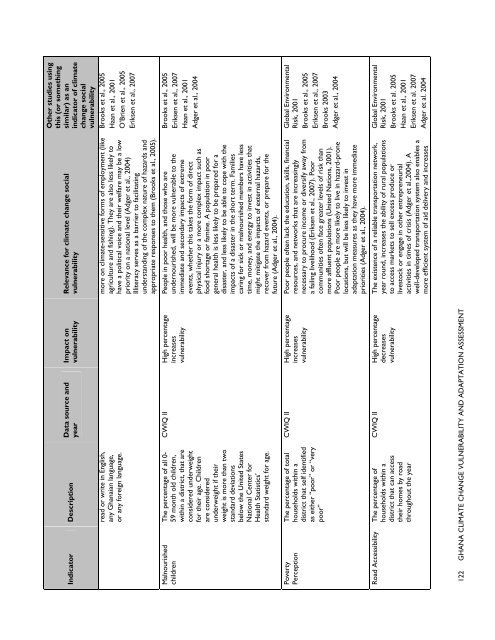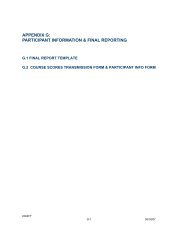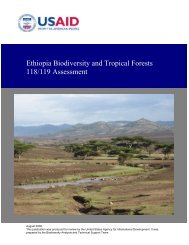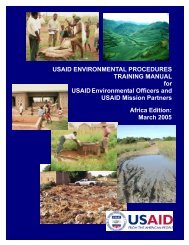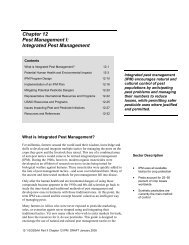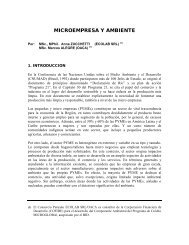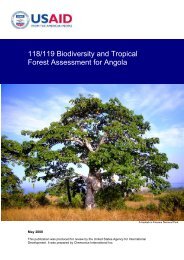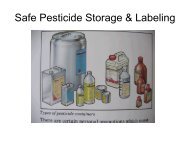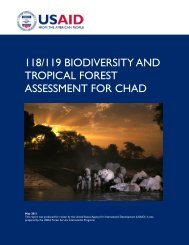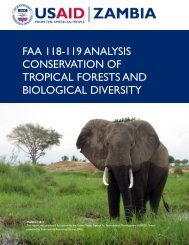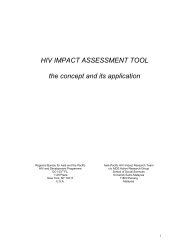ghana climate change vulnerability and adaptation assessment
ghana climate change vulnerability and adaptation assessment
ghana climate change vulnerability and adaptation assessment
- No tags were found...
You also want an ePaper? Increase the reach of your titles
YUMPU automatically turns print PDFs into web optimized ePapers that Google loves.
Indicator DescriptionData source <strong>and</strong>yearImpact on<strong>vulnerability</strong>read or write in English,any Ghanaian language,or any foreign language.MalnourishedchildrenThe percentage of all 0-59 month old children,within a district, that areconsidered underweightfor their age. Childrenare consideredunderweight if theirweight is more than twost<strong>and</strong>ard deviationsbelow the United StatesNational Center forHealth Statistics’st<strong>and</strong>ard weight for age.CWIQ II High percentageincreases<strong>vulnerability</strong>PovertyPerceptionThe percentage of totalhouseholds within adistrict that self identifiedas either “poor” or “verypoor”CWIQ II High percentageincreases<strong>vulnerability</strong>Road Accessibility The percentage ofhouseholds within adistrict that can accesstheir homes by roadthroughout the yearCWIQ II High percentagedecreases<strong>vulnerability</strong>122 GHANA CLIMATE CHANGE VULNERABILITY AND ADAPTATION ASSESSMENTRelevance for <strong>climate</strong> <strong>change</strong> social<strong>vulnerability</strong>more on <strong>climate</strong>-sensitive forms of employment (likeagriculture <strong>and</strong> fishing). They are also less likely tohave a political voice <strong>and</strong> their welfare may be a lowpriority on a national level (Adger et al., 2004)Illiteracy serves as a barrier to facilitatingunderst<strong>and</strong>ing of the complex nature of hazards <strong>and</strong>appropriate responses to them (Brooks et al., 2005).People in poor health, <strong>and</strong> those who areundernourished, will be more vulnerable to theimmediate <strong>and</strong> secondary impacts of extremeevents, whether this takes the form of directphysical injury or a more complex impact such asfood shortage or famine. A population in poorgeneral health is less likely to be prepared for adisaster, <strong>and</strong> less likely to be able to cope with theimpacts of a disaster in the short term. Familiescaring for sick or malnourished members have lesstime, money, <strong>and</strong> energy to invest in activities thatmight mitigate the impacts of external hazards,recover from hazard events, or prepare for thefuture (Adger et al., 2004).Poor people often lack the education, skills, financialresources, <strong>and</strong> networks that are increasinglynecessary to procure income or diversify away froma failing livelihood (Eriksen et al., 2007). Poorcommunities often face greater levels of risk thanmore affluent populations (United Nations, 2001).Poor people are more likely to live in hazard-pronelocations, but will be less likely to invest in<strong>adaptation</strong> measures as they have more immediatepriorities (Adger et al., 2004).The existence of a reliable transportation network,year round, increases the ability of rural populationsto access markets to sell excess produce orlivestock or engage in other entrepreneurialactivities in times of crisis (Adger et al.,2004). Awell-developed transportation system also enables amore efficient system of aid delivery <strong>and</strong> increasesOther studies usingthis (or somethingsimilar) as anindicator of <strong>climate</strong><strong>change</strong> social<strong>vulnerability</strong>Brooks et al., 2005Haan et al., 2001O’Brien et al., 2005Eriksen et al., 2007Brooks et al., 2005Eriksen et al., 2007Haan et al., 2001Adger et al., 2004Global EnvironmentalRisk, 2001Brooks et al., 2005Eriksen et al., 2007Brooks 2003Adger et al., 2004Global EnvironmentalRisk, 2001Brooks et al. 2005Haan et al., 2001Eriksen et al. 2007Adger et al. 2004


